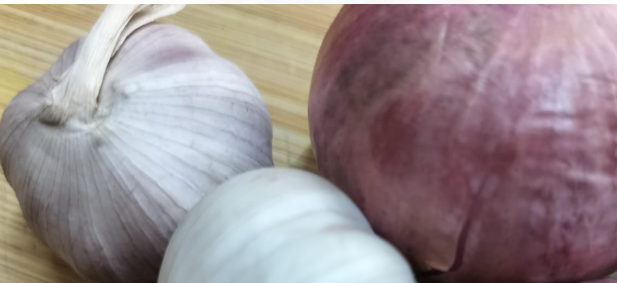
(Photo : BT Creative)
Garlic, Onions
- Cooking garlic and onions in vegetable oil at high temperatures could generate trans-fatty acids (TFAs), harmful to heart health.
- Sulfur-containing compounds in these vegetables can promote the transformation of unsaturated fatty acids (UFAs) into TFAs during cooking.
- The study found that antioxidants can reduce this transformation, but more research is needed to fully understand the implications.
- The World Health Organization warns about the dangers of TFAs, and this study adds to the research on potential health risks associated with certain cooking practices.
A recent study conducted by Japanese researchers at Meijo University has shed light on potential health risks associated with a common culinary practice. The study suggests that cooking garlic and onions in vegetable oil at high temperatures could lead to the generation of trans-fatty acids (TFAs), which are known to be detrimental to heart health. TFAs are a type of fat that can accumulate along the walls of arteries, restricting blood flow and thereby increasing the risk of heart attacks. While these harmful fats are commonly found in processed foods, the study indicates that they can also be created at home during the cooking process.
This is particularly true when unsaturated fatty acids (UFAs), which are usually considered beneficial, are heated at temperatures of 150 degrees Celsius or higher. The researchers focused their study on the role of isothiocyanates and polysulfides, sulfur-containing compounds found in vegetables such as garlic, leeks, onions, scallions, and shallots. These compounds, they found, can promote the trans-isomerisation of vegetable UFAs during cooking. Trans-isomerisation is a molecular reconfiguration that transforms UFAs into TFAs.
To better understand this process, the research team first evaluated the effects of sulfur compounds on triacylglycerols (TAGs) in a model system using reagents. They then tested a variety of foods and oils, including garlic, onion, leek, cabbage, horseradish, broccoli sprouts, and vegetable oils like soybean and olive oils, to simulate actual cooking processes.
The Role of Sulfur Compounds and Antioxidants
The results of the study, which were published online in the journal Food Research International, showed that sulfur compounds significantly promote heat-induced trans-isomerisation of UFAs in vegetable oils. This process is especially prevalent when cooking temperatures exceed 140 degrees Celsius. In addition to their findings on sulfur compounds, the researchers also assessed the role of antioxidants such as alpha-tocopherol in reducing the isomerisation of UFAs in triglycerides like triolein and trilinolein.
While the addition of antioxidants significantly reduced the promotion of UFA's isomerisation by isothiocyanates, they did little to inhibit the promotion of isomerisation by polysulfides. Dr. Masaki Honda, who led the team at Meijo University, explained the implications of their findings. This explains that cooking polysulfide-rich vegetables such as garlic and onions in vegetable oil at high temperatures can generate TFAs, he said. The study demonstrates that garlic and onions significantly promote the trans-isomerisation of UFAs.
However, it's important to note that the release of TFAs under normal cooking conditions is minimal. The researchers suggest that cooking with ingredients rich in natural sulfur compounds may increase the risk of TFA intake, but more research is needed to fully understand the implications of these findings.
Implications and Recommendations
The World Health Organization (WHO) has long warned about the dangers of TFAs, which are responsible for over 278,000 annual deaths worldwide. The global health body recommends that TFA consumption should be limited to less than 1 per cent of daily energy intake. This study adds to a growing body of research on the potential health risks associated with certain cooking practices. In the past, studies have linked high-heat cooking methods, such as grilling and frying, to an increased risk of heart disease and certain types of cancer.
These findings underscore the importance of being mindful of how we prepare our food, and remind us that even seemingly harmless cooking practices can have significant health implications. In conclusion, while the study's findings are concerning, it's important to remember that more research is needed to fully understand the health implications of cooking with sulfur-rich ingredients like garlic and onions. In the meantime, it may be wise to be mindful of cooking temperatures and consider incorporating more antioxidant-rich foods into your diet to help mitigate potential risks.
* This is a contributed article and this content does not necessarily represent the views of btin.co.in









